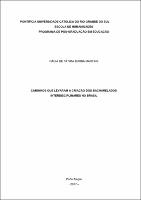| Share record |


|
Please use this identifier to cite or link to this item:
https://tede2.pucrs.br/tede2/handle/tede/7531| Document type: | Dissertação |
| Title: | Caminhos que levaram à criação dos bacharelados interdisciplinares no Brasil |
| Author: | Martins, Nádia de Fátima Borba  |
| Advisor: | Morosini, Marília Costa |
| Abstract (native): | A pesquisa analisa o contexto político-educacional em que foram pensados e criados os cursos de graduação denominados Bacharelados Interdisciplinares. Foi utilizada a pesquisa bibliográfica, de abordagem qualitativa. Como instrumentos para obtenção de dados que contribuíram para a análise daquele contexto, foram feitas entrevistas semiestruturadas, com dois docentes participantes do Grupo de Trabalho instituído pela Portaria SESu/MEC nº. 383, de 12 de abril de 2010, que elaborou os Referenciais Orientadores para os Bacharelados Interdisciplinares. Para subsidiar o estudo, buscou-se o aporte teórico de teses e dissertações nas quais optou-se por utilizar a Abordagem do Ciclo de Políticas de Ball & Bowe no que se refere, especificamente, ao Contexto da Influência. Com a mescla dos estudos sobre a temática realizados e divulgados em teses e dissertações, as experiências relatadas pelos entrevistados e os autores consultados foi possível obter-se informações que apontaram alguns caminhos que conduziram à criação dos Bacharelados Interdisciplinares. Esses caminhos passam, certamente, pelas transformações decorrentes da globalização em todas as áreas e em particular no campo das políticas educacionais. Por outro lado, ao buscar-se identificar os caminhos que levaram à criação, no Brasil, dos Cursos de Graduação denominados Bacharelados Interdisciplinares, pode-se afirmar que esta nova proposta formativa reflete uma situação que se apresenta como tendência no mundo todo: a reorganização do conhecimento na perspectiva da integração interdisciplinar, o que segundo os autores estudados, poderá fazer com que avancem as “fronteiras do conhecimento científico”. O Processo de Bolonha, carro-chefe da reforma de ensino na Europa, foi uma matriz de inspiração para os Bacharelados Interdisciplinares brasileiros. Outra fonte inspiradora da proposta nacional foram os major colleges estadunidenses e a experiência breve da Universidade de Brasília, em 1961, idealizada por Anísio Teixeira e Darcy Ribeiro. Assim, o estudo realizado, trouxe alguma luz sobre os caminhos que levaram à criação dos Cursos de Graduação denominados Bacharelados Interdisciplinares. |
| Abstract (english): | The research analyzes the political-educational context in which graduate courses called Interdisciplinary Bachelors were conceived and created. The bibliographic research was used, with a qualitative approach. As instruments to obtain data that contributed to the analysis of that context, semi-structured interviews were conducted, with two teachers participating in the Working Group, established by the SESu / MEC Ordinance no. 383 of April 12, 2010, which prepared the Guidelines for Interdisciplinary Bachelor's Degree. In order to subsidize the study, the theoretical contribution of theses and dissertations was sought, in which it was decided to use Ball & Bowe's Policy Cycle Approach, specifically regarding the Context of Influence. With the combination of studies on the subject, carried out and disseminated in theses and dissertations, the experiences reported by the interviewees and the authors consulted, it was possible to obtain information that brought some light on the paths that led to the creation of the Graduation Courses called Interdisciplinary Bachelors. These paths are certainly due to the transformations resulting from globalization in all areas and in particular in the field of educational policies. . On the other hand, in seeking to identify the paths that led to the creation in Brazil of undergraduate courses called Interdisciplinary Bachelor's, one can affirm that this new training proposal reflects a situation that presents itself as a worldwide trend: the reorganization of knowledge in the perspective of interdisciplinary integration, which according to the authors studied, could cause the "frontiers of scientific knowledge" to advance. The Bologna Process, flagship of education reform in Europe, was an inspiration matrix for Brazilian Interdisciplinary Bachelor's. Another inspiring source of the national proposal were the major American colleges and the brief experience of the University of Brasilia in 1961, idealized by Anísio Teixeira and Darcy Ribeiro. Thus, the study, brought some light on the paths that led to the creation of the Undergraduate Courses called Interdisciplinary Bachelor. |
| Keywords: | Educação Superior Bacharelado Interdisciplinar Inovação Curricular Ciclo de Políticas |
| CNPQ Knowledge Areas: | CIENCIAS HUMANAS::EDUCACAO |
| Language: | por |
| Country: | Brasil |
| Publisher: | Pontifícia Universidade Católica do Rio Grande do Sul |
| Institution Acronym: | PUCRS |
| Department: | Escola de Humanidades |
| Program: | Programa de Pós-Graduação em Educação |
| Access type: | Acesso Aberto |
| URI: | http://tede2.pucrs.br/tede2/handle/tede/7531 |
| Issue Date: | 21-Mar-2017 |
| Appears in Collections: | Programa de Pós-Graduação em Educação |
Files in This Item:
| File | Description | Size | Format | |
|---|---|---|---|---|
| DIS_NADIA_DE_FATIMA_BORBA_MARTINS_COMPLETO.pdf | Texto Completo | 1.08 MB | Adobe PDF |  Download/Open Preview |
Items in DSpace are protected by copyright, with all rights reserved, unless otherwise indicated.




